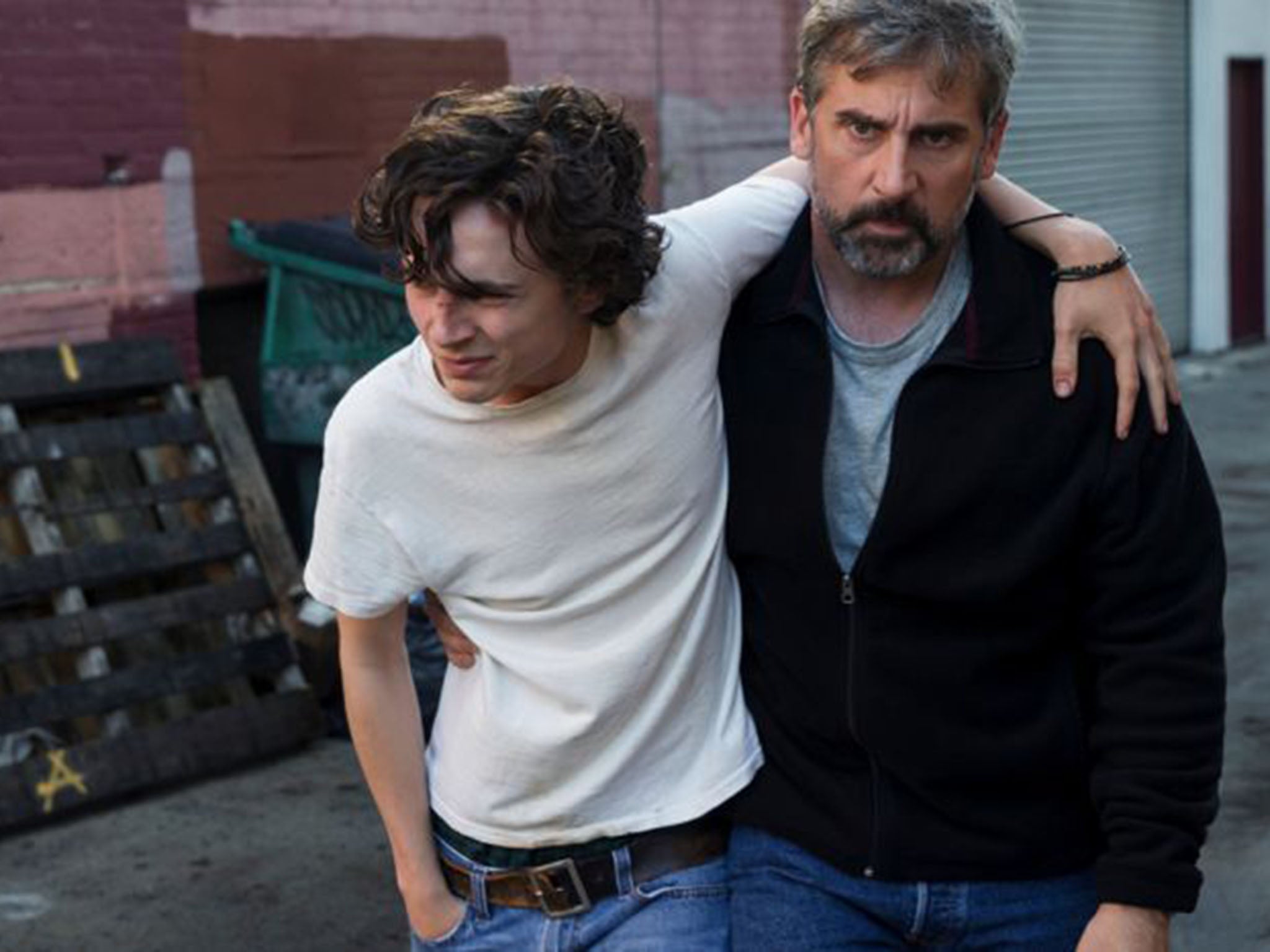My terrifying experience of addiction and why Beautiful Boy is the most authentic portrayal of drug dependence I’ve seen
The film starring Timothée Chalamet and Steve Carell depicts a son whose drug addiction makes him beyond help. Our columnist Lucy Jones, who started drinking at 12 and later graduated to hard drugs, found it gut-wrenching to watch


I left the screening of Beautiful Boy yesterday in tears. I’ve never cried so much at a film, throughout, and then afterwards, in a stairwell on the bleak, cold streets of Soho. It was the rawest and most authentic portrayal of active addiction and alcoholism I’ve ever seen and brought me back vividly to my own terrifying experience and the enormous relief of finding a way out.
Beautiful Boy is a true story told from two perspectives: a son battling drug addiction, Nic Sheff, played by Timothée Chalamet, and his father, the journalist David Sheff, played by Steve Carell (who’s swiftly becoming one of the all-time greats). Really, it’s a horror film, on multiple levels. “When you become a parent, you are perpetually living in fear of something bad happening to them,” Carell said on Radio 4’s Front Row this week. “It’s beyond scary. It’s almost incomprehensible to see your kid spiralling out of control and having no recourse.”
The film’s portrayal of the hurtling, out-of-control nature of addiction rang very true for me. By the end, Nic’s life is as terrifying and uncontrollable as the huge waves he surfs in. Active addiction is a living hell.
My own problems with addiction began early. I got drunk for the first time when I was 12 and I liked it from the get-go. It was at a school choir concert and my parents weren’t at the reception before, so I was at liberty to sneak glasses of warm, piss-yellow wine from the table and drink them in the bathroom. When I got home, I was so drunk I fell down the stairs. Later, I looked in the mirror and thought, this is it, I want more of this. I had discovered a safe place, a warm blanket of protection that meant I could escape. I didn’t realise I was starting to lose myself. Then followed 15 years of alcoholic drinking and drug use with increasingly painful consequences and mental health problems. Eventually, when I tried to stop, I found myself trapped: the danger was now manifesting in different ways.
Beautiful Boy is not a linear narrative, because stories of addiction and recovery rarely are: Nic accepts treatment, clocks up clean days, then relapses again and again, with the consequences becoming worse and worse. We see the father’s evolution from quiet, brooding confusion and bewilderment, trying to figure out who his son is by leafing through the books in his room and looking at his posters of Metallica and Nirvana and Bowie, via anger and panic, to acceptance and grief. He has the roving eyes of a sentinel, always staring at his son anxiously, obsessively, desperate to protect his beloved boy.
This dual perspective brings the characters to life with empathy for both sides. We see Nic’s selfishness and the terror and destruction he puts his family through but we also witness his pain and fundamental discomfort with being alive. It offers an astute portrait of the emotional and mental state people who become addicts often start with: a feeling of unease, lack of comfort in one’s own skin, self-loathing. “It takes the edge off things,” as the young Nic tries to explain.
I experienced the same thing. Like others who become overly fond of alcohol, I was sensitive to surroundings, sudden change, bright lights, loud noises, prickly jumpers, arguments, lack of sleep, interactions, thoughts, guilt. From young adolescence, I drank to regulate my emotional state and ease the flatness and tension of depressive episodes.
It worked for a while and took me to friends, fun, laughter, music, dance and relief. Later it took me to carelessness, hopelessness and a lack of self-regard. It took on a life of its own and I became an automaton at the behest of my next fix: alcohol, cocaine, MDMA, ketamine, although it was cocaine that brought me to my knees, the Miracle-Gro on my alcoholism.

Physical and mental health, financial and relationship problems mounted, although I was adept at hiding much of my behaviour and inner angst from my family. I had started drinking in secret at a young age. Towards the end it took me to places of blurred, blackout danger. Most were self-destructive but on one occasion a harmful incident with a stranger frightened me enough to try to get help. I started to see a psychiatrist and psychotherapist and there followed a couple of years of trying and failing to stop week after week with the consequences of each relapse becoming more depressing and frightening. When you find yourself in a cemetery in New Orleans contemplating scoring crack cocaine from a man in a dressing gown, you know it’s time to stop.
Gradually, the penny started to drop and I realised – with horror – that I was utterly powerless to get sober and drug-free on my own. I entered a rehabilitation programme in April 2012 after a particularly self-destructive binge. It has taken hours of attendance and “work” alongside the help of medicine and psychotherapy but bar a relapse in the first few weeks, I have been sober and clean since then.
One of the misconceptions of addiction is that it is a moral failing, or a choice, or a sign of weakness. Society thus sees it as a shameful thing, which cloaks it in stigma, to be swept under the carpet or treated with a stiff upper lip or by the criminal justice system, rather than being treated as the health matter and illness it truly is. The image of addiction is starting to evolve – The New York Times recently apologised for demonising mothers during the 1990s crack epidemic – from the idea that addicts are bad, deficient, self-indulgent people who don’t deserve resources or treatment towards a more sympathetic outlook but a lack of understanding remains.
Films like Beautiful Boy and science-based education and media can challenge these misconceptions. Simply put: some people can take drugs and drink without becoming addicts; others experience a phenomenon of craving which is akin to an allergic reaction. There is nothing moral about it.
There are many truths in the film that differ from the way people sometimes think about addiction. For a start, addiction doesn’t discriminate. “This is not us; this is not who we are,” says David Sheff in the film, speaking to the idea that a middle-class, professional family shouldn’t produce a son who becomes addicted to drugs. But it doesn’t work like that. Partly, there is a genetic basis, and there are many other potential risk factors: age of first use, untreated trauma, learning disabilities and psychological troubles, an overactive amygdala, family stress.
We walk alongside David as he researches and begins to understand the science of addiction and that his child is self-medicating. The film mentions briefly the biological basis of addiction, and how damage of nerve endings causes the user to need more and more. But it also – and this was a crucial note of hope in the treatment I received – talks about neuroplasticity, that those fried nerve endings can grow back, that you can recover and live freely.
From the other perspective, David reaches a resolution of sorts when he accepts that he can’t, ultimately, help his son. “I don’t think you can save people,” says his wife. Another truth. The acceptance that David can’t cure or control his son’s addiction is a blessed relief for the viewer.
Of course, addiction – and mental illness in general – can be frightening and confusing for people with little experience of it but the more we learn and talk about the nuances of it, the fact it is everywhere, often starts young, and most of us will know someone who suffers from it, the more chance we have of better prevention and treatment.
Considering the opioid epidemic in the US and rising levels of mental health problems in children and “deaths of despair” in the UK, there is an urgent need to focus on how to prevent and mitigate the social problems and risk factors that could lead to addiction. Punishment and stigma clearly aren’t working. Empathy, compassion and knowledge are needed.
Before I hit rock bottom, I thought an alcoholic was just someone who sloshed vodka on their cornflakes or a street drunk drinking whisky out of a paper bag. I thought a drug addict was someone who used needles. If we are more open about addiction and mental illness, we will become better at treating problems earlier on, and more adept at spotting when young people are drinking in a self-medicating way. But to do this, we need to talk about it more, which is why films like Beautiful Boy need to be made. In my recovering I’ve found that it is ultimately connection and sharing with other people in the same boat that has saved my life. There is help out there, for both sides.
To find out about support services for drug-related issues, visit addaction.org.uk
For support with mental health issues, visit mind.org or samaritans.org

Join our commenting forum
Join thought-provoking conversations, follow other Independent readers and see their replies
Comments
Bookmark popover
Removed from bookmarks